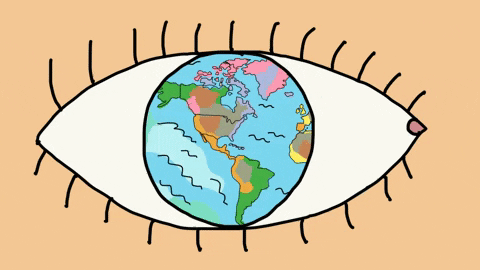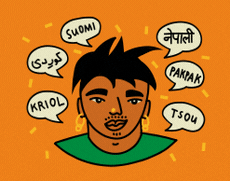- Subscribe
- Mark as read
- Mark as new
- Mark as New
- Bookmark
- Subscribe
- Mute
- Subscribe to RSS Feed
- Permalink

Can you share an interesting fact or something you wish others knew about your mother language?
- Mark as New
- Bookmark
- Subscribe
- Mute
- Subscribe to RSS Feed
- Permalink
Hindi and Urdu are essentially the same languages. The main difference is that Urdu is written with the Arabic script whereas Hindi is written in the script originally used for Sanskrit, Devanagari. Urdu has a lot more Persian and Arabic loanwords than Hindi, but these are almost exclusively used in formal speech and the two languages remain completely mutually intelligible.
- Mariam
Besides my paternal grandmother, almost everyone in my family can speak English, Thai and Cantonese, so we have a tendency to mix the three altogether. This makes some unfortunate coincidences rather confusing - eg. “pheng” in Thai means expensive, but the similar sounding “peng” in Cantonese means cheap 🤪
- Ange
Scottish Gaelic is an endangered language with only about 20 or 30 thousand people who actively speak it in the world; it's likely there's no-one left now who only speaks Scottish Gaelic without also speaking a more dominant language like English.
- Philippa
An interesting fact about being a Bengali is that the first non-European Nobel Prize winner in Literature was Rabindranath Tagore back in 1913.
He was a poet, writer, playwright, composer, philosopher, social reformer and also the only person in the world who composed the national anthem of 2 countries (India & Bangladesh) - pretty cool right?
- Tithi
The Dutch language can really be found all over the world, which is surprising for such a small country. Dutch is spoken in the Netherlands and Belgium, but it’s also the official language in Suriname, and the Caribbean islands Aruba, Curacao, and St. Maarten. Besides, Dutch is very similar to Afrikaans which is spoken in South Africa. The Dutch language has also had a big influence on the Indonesian language, and there’s several words that are exactly the same in both languages.
- Marit
Different languages often have different ‘personalities’, and it’s interesting how your personal experience can shape these.
Cantonese is typically regarded as sounding brash and forceful, whereas my experience with my Cantonese family members makes me think of the language as sounding friendly, gentle and even cute.
On the flip side, Shanghainese is often thought to be smooth and easy to listen to, but to me, it doesn’t sound as pleasant as Cantonese.
- Anna
Chinese is a language without tense, so the only way to distinguish actions in the time domain is purely based on the context.
- Joey
For the languages my family does speak, some of the words are abbreviated from each other. They become shorter and easier to say with fewer syllables to the point where forming a sentence makes it indistinct from their origins.
- Nigel
The english word Jungle originated from the Hindi word of the same meaning.
- Azhaan
German is the most common language in the European Union (ahead of English, French and Spanish). It's the 11th most popular in the world.
German has been described as the language of writers and thinkers with greats such as Goethe, Kant, Marx, Humboldt and Nietzsche to its credit.
The German language used to have the longest word with 63 letters but even the Germans found it too difficult to pronounce so it was made obsolete.
- Janina
- Mark as New
- Bookmark
- Subscribe
- Mute
- Subscribe to RSS Feed
- Permalink

What is your mother language, and what does it mean to you?
- Mark as New
- Bookmark
- Subscribe
- Mute
- Subscribe to RSS Feed
- Permalink
My mother language is Urdu, the official national language and lingua franca of Pakistan.
Urdu is an Indo-Aryan language, written in the Perso-Arabic script. It is a beautiful language that to me serves as a connection to my homeland and my cultural identity.
It’s a language that I’m consciously passing on to my almost 3 year old daughter, so that she can always remain connected to her roots and is always able to maintain a connection with the older generations of her family back in Pakistan.
- Mariam
Even though I was born in Australia, my first language was Cantonese because my parents wanted to make sure I could communicate with my paternal grandmother who could only speak Cantonese.
These days I speak more Thai because it’s my mum’s preferred language. I think it’s important to make mum feel more comfortable because English can be a struggle for her.
Cantonese or Thai, it’s important to me to be able to communicate with older generations of my family, and to feel connected to relatives overseas. Connection is so important for your own sense of self and belonging - something which I didn’t appreciate when I was younger and trying too hard to fit in with my peers, but now I embrace my background.
- Ange
My mother language is Scottish Gaelic - it was my grandmother's native language and she didn't speak English until she went to school.
At the time there was severe prejudice against people who spoke Gaelic so she was punished at school for speaking her language.
Because of that, she decided not to pass Gaelic on to her children and grandchildren, so sadly we only have a few words.
I’ve always felt a really strong connection to the Gaelic language and one of my last treasured memories before my grandmother died was when a friend of hers taught me how to say a phrase in Gaelic to surprise her with - she was over the moon.
Trying to learn to speak Gaelic is also what brought me and my partner together, so my mother language basically gave me my family.
- Philippa
I’m from a Bengali family and while my entire family speaks the language - I only know the basics. I mean I can speak, read and write - but probably a 3rd grader could do it better than me. But this hasn’t disheartened me as much, because India is a multicultural and multilingual country.
Given I studied and lived in different parts of India, I picked up other languages like Hindi, Tamil, Punjabi, Assamese (and the list goes on). So to me, my preferred language is any language from my motherland of India.
- Tithi
My mother language is Dutch, as I was born and raised in the Netherlands and only started learning English in my teens.
I love being able to speak multiple languages, and I almost feel more of a connection to the Dutch language now that I don’t live in the Netherlands anymore. Speaking Dutch with my Dutch friends here in Sydney helps me feel connected to the Netherlands despite being so far away from home.
- Marit
My mother languages are Cantonese and Shanghainese. At different points in my life, I’ve felt varying levels of connection to those languages and cultures. In childhood, it was a way to connect to my extended family; in my late teens, it was an unwanted reminder of how I was treated as a girl in a very patriarchal household; and in my early twenties I completely disconnected as I estranged myself from some family members, and my social circle became increasingly non-Chinese.
I’ve now circled back and learnt to disconnect language and culture from family. I know this is contrary to many experiences out there, but it’s what works for me so I can stay connected to who I am and where I come from, without the parts that I disagree with.
- Anna
My mother language is both Mandarin and Cantonese. Having the ability to speak these languages helps me to establish connections between me and my families that are far away from me.
- Joey
My main mother language is Filipino, specifically Tagalog. However, the Philippines has nearly 200 languages and so my family also speaks Cebuano, Bisaya, and Bantayanon. I can't speak much of any of them and can only understand parts. I would say having Filipino as my mother language means more about my culture, upbringing, and family as opposed to the words themselves. I have a connection to others that isn't blood and yet it holds significance to me.
- Nigel
My mother language is a dialect of Hindi and Urdu and it stands as a way for me to connect to my heritage. Speaking in Hindi at home and being able to easily understand and talk to my grandparents when we visit India means so much to me. And I may be biased here, but English just doesn’t hit the same.
- Azhaan
My mother language is German. It's the language that I count in and use as my alphabet, even when I try to spell in English. My mother and I also use it to talk about things we don't want anyone else in my family to understand. It’s a bit naughty of us, but the girls have to have some secrets
- Janina
- Mark as New
- Bookmark
- Subscribe
- Mute
- Subscribe to RSS Feed
- Permalink
Hey, community 👋
I asked the team at ReachOut about their mother languages, and I'm about to share all of the responses we got.
Feel free to get involved and tell us about your or your families mother tongue!

